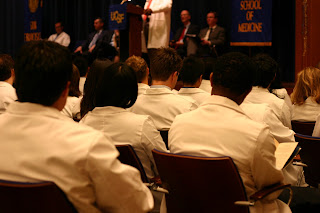
Before inserting a speculum (a metallic instrument that helps better view the cervix) into any vagina, we always ask our patients to take a deep breath. The rule can be generalized to when we insert anything into the vagina. And on exhalation the speculum goes in. As I asked my patient to take a deep breath, my patient was watching me, giving me similar instructions.
"Eisha, breathe." Oh yeah, I forgot that part. Don't forget to exhale. In between handling the duck bill of the speculum, inserting the metallic monstrosity into the vaginal opening, pushing it through and looking into the metal mouth while opening the mouth to identify the cervix (which just pops out from nowhere), I must have forgotten to exhale (I certainly hope my face was not showing my apprehension).
Today was another milestone in my medical school life- completing my first female pelvic exam. It was thorough and complete (with a fair share of awkwardness and difficulty), including everything from examining the external and internal genitalia to the speculum exam to the rectovaginal exam.
It's a unique exam because your fingers are not only palpating and exploring new territories (I never knew my finger could go in that deep), they are also "seeing" for you. Although I have seen the Netter images of the uterus, vagina and pelvic muscles and dissected the pelvic viscera- I felt somewhat blind as I made my way around the fornices and uterus. It felt odd, relying solely on a finger in a small space to reveal the anatomy.
Our patient knows her body extremely well. With a hand mirror, she was able to verbally guide me through the exam, capable of engaging me in a conversation even while I nervously tried to readjust my finger to better palpate her uterus or cervix. She is an educator, who feels "empowered" to assist budding physicians and health care providers. She instructed us to "let go of any anxiety."
She prides herself in effectively training health care providers to perform the pelvic exam and develop rapport with patients. She was fantastic; I was impressed by her calming presence and extensive knowledge of her own anatomy.
"Everything you say or do must have intention," she said. The pelvic exam is like no other because your patient probably feels the most uncomfortable and vulnerable. (Any woman that has had to put her legs in stir-ups for the pelvic exam can attest to the discomfort and unpleasantness of the exam). For this reason, we must explain each step (especially since our patient can not see what we are doing down there) and we must be careful about what we say, and only say things that have a purpose in our exam. Word choice is pivotal. "Normal and healthy" are probably better descriptors than "perfect or beautiful."
Like anything else, practice makes perfect. I know it will take me a couple of exams before I can really understand the exam and know that I am, in fact, palpating an ovary and not just the vaginal wall (believe me, it's difficult the first time, at least for me). And I'll remember to exhale...








